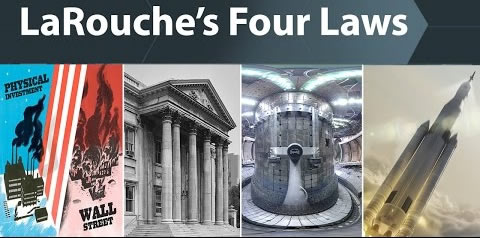The New Silk Road:
Hope in Times of Imminent Danger
By Klaus Fimmen
October 2017
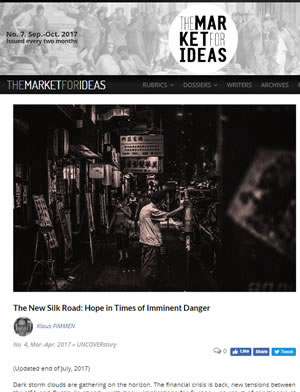 |
This article by Schiller Institute’s Klaus Fimmen was published in Issue 4 of this year of the Romanian journal, Market for Ideas, and reviews the entire history of the New Silk Road development and introduces LaRouche’s “Four Laws”. The article states that trying to view China’s policy as just another variant of geopolitics misses the point, particularly with China investing in the development of Africa, which is something that the European colonial powers never did! Fimmen concludes that now is the time for nations to give up geopolitical suicide, and opt instead for a better future: China’s Belt and Road Initiative is the perfect framework to establish sound and long-term trade arrangements on win-win principles among nations.
Dark storm clouds are gathering on the horizon. The financial crisis is back, new tensions between the USA and Russia lie ahead — with heavy implications for Europe — as result of sanctions just established by the American Congress, not the President. On the other hand, we have an inkling of a new and more just world order in the making by China’s New Silk Road Initiative, formerly known as the One Belt, One Road and commonly named the Belt and Road Initiative. If mankind is to survive, we have to bury the old paradigm of geopolitics, that brought us two World Wars and threatens us today with the deadly prospect of a final one — the thermonuclear annihilation of civilization.
New visions
When Chinese President Xi Jinping announced in 2013 the initiative of the New Silk Road and the Maritime Silk Road, only a few understood the healthy implications for the world economy as a whole. And even fewer understood the philosophical and cultural implications.
View full size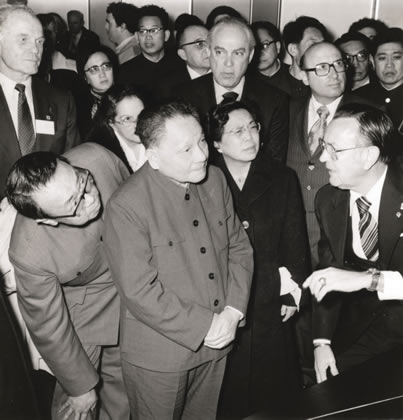
NASA
Deng Xiaoping (center) and his wife Zhuo Lin (right of him) being briefed by Johnson Space Center director Christopher C. Kraft (right front) on Feb. 2, 1979. |
When China, under the leadership of Deng Xiaoping some forty years ago started this success story, special economic zones with cheap labor for foreign companies were established. With this approach, China was able to start modernizing her production processes, predominantly at her Eastern shore, and also to accumulate vast foreign reserves. Confronted with the resulting internal migration movement toward the coastal regions with all the concomitant social problems, the national leadership had to find a solution. To develop the inner and Western parts of the country was the most obvious answer. The financial crisis of 2008 and the loose monetary policy of the US Federal Reserve thereafter convinced the Chinese leadership to better invest their mainly Dollar denominated trade surplus for productive purposes around the globe also as a haven against currency risk. All of these aspects were then combined in one overall strategy: The New Silk Road (now named the Belt and Road Initiative).
When Chinese President Xi Jinping announced in 2013 the initiative of the New Silk Road and the Maritime Silk Road, only a few understood the healthy implications for the world economy as a whole. And even fewer understood the philosophical and cultural implications. In this short period of time, the last four years, a "baker’s dozen" of financial institutions like the Silk Road Fund, the Asian Infrastructure Investment Bank (AIIB), the New Development Bank of the BRICS Group, to name only a few, were established and started working to finance projects predominantly in the spheres of infrastructure, industrial production, modern farming etc. With more than $500 billion already invested, this is the biggest growth initiative in world history. Estimates are even going further in the range of several trillions in investment over the next few years.
A way forward for Africa
View full size
Xinhua
Addis Ababa-Djibouti Railroad, Ethiopia. |
View full size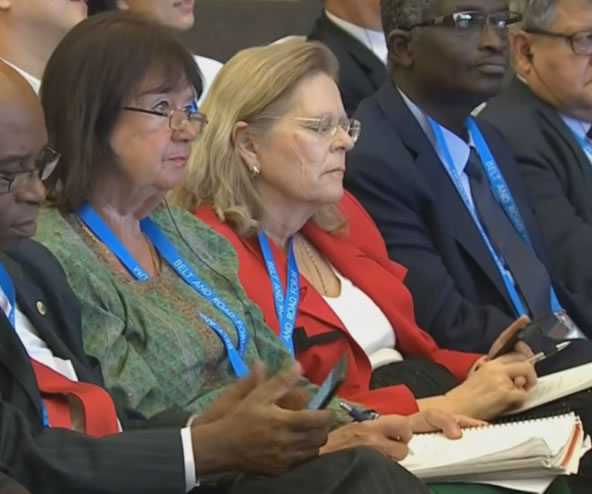
Helga Zepp-LaRouche at the Plenary Session of the Belt and Road Forum. Screenshot at 34:10. |
In Africa, the Chinese are doing what the colonial powers never did — they started to build a state of the art standard gauge railway grid throughout the continent.
In Africa, the Chinese are doing what the colonial powers never did — they started to build a state of the art standard gauge railway grid throughout the continent. Examples include the Djibouti-Addis Ababa line in Ethiopia or the just inaugurated Mombasa-Nairobi connection in Kenya. There are similar projects in Angola, Tanzania, Nigeria — some finished, some under construction, some in the planning stage. For one of the most ambitious projects, the Trans-Aqua, a Chinese company is preparing the feasibility study. Trans Aqua is a canal project, diverting about 5 percent of water of the tributaries of the Congo river, to refill the dried-out Lake Chad and build a 2400 km waterway in central Africa, which will benefit ten countries and more than 40 million people.
African delegates were, for the first time in decades, enthusiastic about the perspective of alleviating poverty in their home countries.
When in mid-May of this year delegations from 130 countries, including 29 head of states, gathered in Beijing at the Belt and Road Forum, the widely shared opinion was that they were witnessing history in the making. African delegates were, for the first time in decades, enthusiastic about the perspective of alleviating poverty in their home countries. China’s success in lifting more than 700 million people out of poverty in the last 30 years proves the fact that it can be done. In the same time, the western model of unrestricted speculation is losing its attraction in those countries.
Does history repeat itself?
 |
People caught in the old paradigm of geopolitics argue that the Anglo-American empire will now be replaced by a Chinese empire. But that is far from the truth. To understand China and its President Xi Jinping, one has to study Confucianism — this enlightened philosophy with all its parallels to the best aspects of Christianity — as the great universal scholar Gottfried Wilhelm Leibniz proved already in the seventeenth century (Novissima Sinica, 1697).
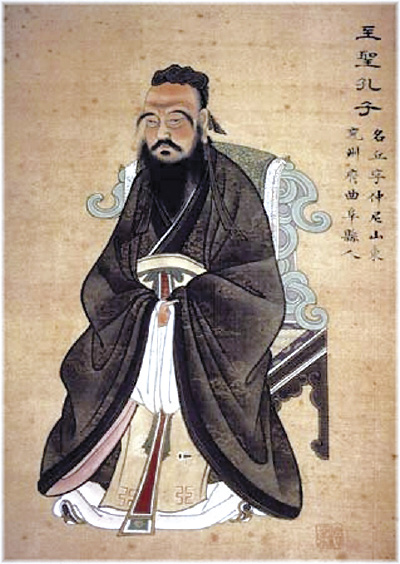
Confucius (551-479 B.C.) |
Every contract between states has to take into account the justified interest of the other. Instead of "beggar thy neighbor," as the West did more and more in the last forty years, the proposal is to make one’s neighbor rich, so that he becomes a solid trading partner and eventually a friend.
When Xi Jinping speaks again and again about win-win cooperation or to form a community of common destiny, he bases his arguments on something that was the basis of modern international law since the Peace of Westphalia, namely that every contract between states has to take into account the justified interest of the other. Instead of "beggar thy neighbor," as the West did more and more in the last forty years, the proposal is to make one’s neighbor rich, so that he becomes a solid trading partner and eventually a friend. This reflects a positive view of man who is able to use reason and creativity to overcome lower instincts and the repetition of a barbarous past.
But we will also have a barbarous future, if we are to follow the path of confrontation and destabilization as in the last fifteen years of permanent warfare. The imminent danger of a new financial crisis, far worse than 2007/2008, precipitated by the bursting of the bubbles created by the central banks with their low interest rate policies and outright printing of money called quantitative easing is one of the main driving forces behind the crazy warmongering of the neoconservative strata in the United Kingdom, the United States and elsewhere.
While the Belt and Road Initiative is a very attractive policy for most states of this globe, it is not yet strong enough to withstand the financial storm in front of us.
Prescriptions on resilience
|
LaRouche's Four Laws: 1. Reinstate FDR’s Glass-Steagall banking separation 2. Return to a Hamiltonian System of national banking 3. Invest federal credit to increase physical productivity. 4. Launch a crash program for fusion power and the development of the Moon for industry and as a platform for deeper space missions. |
American economist and statesman Lyndon LaRouche already defined in June 2014 four steps to overcome the financial and economic crisis (Four Laws to save the U.S.A.). To save the deposits of ordinary people, the commercial banks have to be totally isolated from the investment banks, by erecting a firewall between them, as Franklin D. Roosevelt’s Glass-Steagall Act did before it was eliminated in 1999 by the Clinton Administration (some arguing that it had been undermined earlier). This is meant to ensure that the coming financial storm hits mainly the speculators, while shielding, to the greatest extent possible, the real economy which may survive, but probably not unharmed. His next suggestion is to prevent a longer period of depression and hardship through the creation of vast volumes of credit to activate the productive potential of each American state, to bring people quickly into good paying fulltime jobs. A National Bank as was founded by first US treasury secretary Alexander Hamilton after the American War of Independence would be suited perfectly for such a task.
Instead of creating credit by central banks to save the speculators, this kind of credit creation is strictly bound to productive investments in infrastructure, production and research and development. The enlarged ability to produce wealth as well as the larger tax base will pay for the loans. Additionally, each state has to define areas of high technology development, to raise the overall productivity of its population. Research in aerospace, the development of fusion power and related areas of plasma physics are essential in this respect.
Conclusion
If we do our homework in this sense, then China’s Belt and Road Initiative will be the perfect framework to establish sound and long-term trade arrangements on win-win principles among nations. The decision that must be made now is whether we, as European citizens, are willing to join China, Russia and other Eurasian nations to build a better, prosperous future, or whether crumbling past paradigms reflecting Anglo-American dominance are to become a suicide pact.


